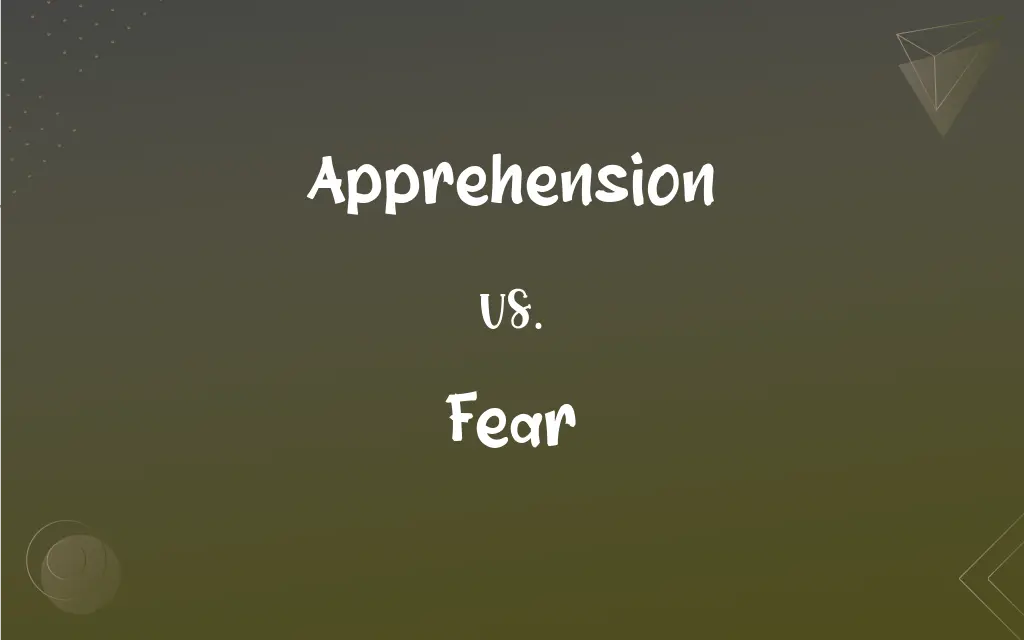Apprehension vs. Fear: What's the Difference?
Edited by Aimie Carlson || By Janet White || Updated on September 30, 2023
Apprehension is anxiety or fear about the future, while fear is a distressing emotion aroused by impending danger, evil, or pain.

Key Differences
Apprehension and Fear, while similar, diverge in their scopes and triggers. Apprehension is generally characterized by a feeling of anxiety or fear that something bad or unpleasant will happen in the future. It is a sense of foreboding or anticipation of adverse outcomes, often marked by unease and worry. On the contrary, fear is a more intense and immediate emotion triggered by the perception of an imminent threat or danger, usually leading to a fight-or-flight response.
Apprehension is often associated with uncertainty and is usually more focused on future events or outcomes. It might not have a clear and present stimulus, making it more associated with worry about the unknown or the anticipation of potential problems. Fear, however, is an emotional response to a known or defined threat, and it is generally a reaction to something tangible and current, causing a more immediate and often more intense response.
Apprehension, being more future-oriented, can lead to prolonged stress and anxiety as it relates to anticipated events or consequences. This could involve situations where the outcome is uncertain, and there is a possibility of negative results, making individuals experience discomfort and concern. In contrast, fear tends to be short-lived and is typically a survival mechanism, alerting individuals to the presence of danger and preparing the body to react, either by escaping or confronting the threat.
In terms of physiological responses, both apprehension and fear can activate the body’s stress response, leading to symptoms such as increased heart rate, sweating, and heightened senses. However, fear usually provokes more pronounced and immediate physiological reactions due to its direct link to perceived threats, while the responses to apprehension might be less intense and more prolonged, given its association with anticipation and uncertainty.
Comparison Chart
Definition
Anxiety or fear about the future.
A distressing emotion aroused by impending danger.
ADVERTISEMENT
Trigger
Uncertainty and anticipation of adverse outcomes.
Known or defined imminent threat or danger.
Duration
Can be prolonged due to its future-oriented nature.
Generally short-lived and immediate.
Physiological Response
Can be less intense and more prolonged.
Usually more pronounced and immediate.
Focus
More on future events or outcomes.
On immediate and present threats or dangers.
Apprehension and Fear Definitions
Apprehension
Understanding or grasp.
His apprehension of the complex theory was commendable.
ADVERTISEMENT
Fear
A feeling of anxiety concerning the outcome of something.
He lived in constant fear of failure.
Apprehension
Anticipation of adversity or misfortune.
There was a sense of apprehension in the room as they awaited the verdict.
Fear
A reverential awe, especially toward God.
He acted out of fear of the Lord.
Apprehension
Suspicion or fear of future trouble or evil.
The haunted house filled him with apprehension.
Fear
The likelihood of something unwelcome happening.
There is no fear of him failing.
Apprehension
The act of arresting or capturing.
The apprehension of the suspect occurred without incident.
Fear
To be afraid of someone or something as likely to be dangerous.
He fears the wrath of his parents.
Apprehension
A fearful or uneasy anticipation of the future.
She felt apprehension about her upcoming exams.
Fear
A very unpleasant or disturbing feeling caused by the presence or imminence of danger
Our fears intensified as the storm approached.
Apprehension
Fearful or uneasy anticipation of the future; dread.
Fear
A state or condition marked by this feeling
Living in constant fear of attack.
Saved as much as he could for fear of losing his job.
Apprehension
The act of seizing or capturing; arrest.
Fear
A feeling of disquiet or apprehension
A fear of looking foolish.
Apprehension
The ability to apprehend or understand; understanding.
Fear
A reason for dread or apprehension
Being alone is my greatest fear.
Apprehension
(rare) The physical act of seizing or taking hold of (something); seizing.
Fear
Extreme reverence or awe, as toward a deity.
Apprehension
(legal) The act of seizing or taking by legal process; arrest.
Fear
To be afraid or frightened of
A boy who fears spiders.
Apprehension
Perception; the act of understanding using one's intellect without affirming, denying, or passing any judgment
Fear
To be uneasy or apprehensive about
We all feared what we would see when the grades were posted.
Apprehension
Opinion; conception; sentiment; idea.
Fear
To consider probable; expect
I fear you are wrong. I fear I have bad news for you.
Apprehension
The faculty by which ideas are conceived or by which perceptions are grasped; understanding.
Fear
To revere or be in awe of (a deity, for example).
Apprehension
Anticipation, especially of unfavorable things such as dread or fear or the prospect of something unpleasant in the future.
Fear
To be afraid
Your injury is minor. Don't fear.
Apprehension
The act of seizing or taking hold of; seizure; as, the hand is an organ of apprehension.
Fear
To be uneasy or apprehensive
We fear for the future of the business.
Apprehension
The act of seizing or taking by legal process; arrest; as, the felon, after his apprehension, escaped.
Fear
(uncountable) A strong, uncontrollable, unpleasant emotion or feeling caused by actual or perceived danger or threat.
He was struck by fear on seeing the snake.
Apprehension
The act of grasping with the intellect; the contemplation of things, without affirming, denying, or passing any judgment; intellection; perception.
Simple apprehension denotes no more than the soul's naked intellection of an object.
Fear
(countable) A phobia, a sense of fear induced by something or someone.
Not everybody has the same fears.
I have a fear of ants.
Apprehension
Opinion; conception; sentiment; idea.
To false, and to be thought false, is all one in respect of men, who act not according to truth, but apprehension.
Fear
(uncountable) Terrified veneration or reverence, particularly towards God, gods, or sovereigns.
Apprehension
The faculty by which ideas are conceived; understanding; as, a man of dull apprehension.
Fear
(transitive) To be afraid of (something or someone); to consider or expect (something or someone) with alarm.
I fear the worst will happen.
Apprehension
Anticipation, mostly of things unfavorable; distrust or fear at the prospect of future evil.
After the death of his nephew Caligula, Claudius was in no small apprehension for his own life.
Fear
(intransitive) To feel fear.
Never fear; help is always near.
Apprehension
Fearful expectation or anticipation;
The student looked around the examination room with apprehension
Fear
To worry about, to feel concern for, to be afraid for.
She fears for her son’s safety.
Apprehension
The cognitive condition of someone who understands;
He has virtually no understanding of social cause and effect
Fear
(transitive) To venerate; to feel awe towards.
People who fear God can be found in Christian churches.
Apprehension
Painful expectation
Fear
(transitive) To regret.
I fear I have bad news for you: your husband has died.
Apprehension
The act of apprehending (especially apprehending a criminal);
The policeman on the beat got credit for the collar
Fear
To cause fear to; to frighten.
Fear
To be anxious or solicitous for.
Fear
To suspect; to doubt.
Fear
(dialectal) Able; capable; stout; strong; sound.
Hale and fear
Fear
A variant of Fere, a mate, a companion.
Fear
A painful emotion or passion excited by the expectation of evil, or the apprehension of impending danger; apprehension; anxiety; solicitude; alarm; dread.
Fear is an uneasiness of the mind, upon the thought of future evil likely to befall us.
Where no hope is left, is left no fear.
Fear
Apprehension of incurring, or solicitude to avoid, God's wrath; the trembling and awful reverence felt toward the Supreme Being.
I will put my fear in their hearts.
I will teach you the fear of the Lord.
Render therefore to all their dues; tribute to whom tribute is due . . . fear to whom fear.
Fear
That which causes, or which is the object of, apprehension or alarm; source or occasion of terror; danger; dreadfulness.
There were they in great fear, where no fear was.
The fear of your adventure would counsel you to a more equal enterprise.
Fear
To feel a painful apprehension of; to be afraid of; to consider or expect with emotion of alarm or solicitude.
I will fear no evil, for thou art with me.
Fear
To have a reverential awe of; to be solicitous to avoid the displeasure of.
Leave them to God above; him serve and fear.
Fear
To be anxious or solicitous for; now replaced by fear for.
The sins of the father are to be laid upon the children, therefore . . . I fear you.
Fear
To suspect; to doubt.
Ay what else, fear you not her courage?
Fear
To affright; to terrify; to drive away or prevent approach of by fear.
Fear their people from doing evil.
Tush, tush! fear boys with bugs.
Fear
To be in apprehension of evil; to be afraid; to feel anxiety on account of some expected evil.
I exceedingly fear and quake.
Fear
An emotion experienced in anticipation of some specific pain or danger (usually accompanied by a desire to flee or fight)
Fear
An anxious feeling;
Care had aged him
They hushed it up out of fear of public reaction
Fear
A profound emotion inspired by a deity;
The fear of God
Fear
Be afraid or feel anxious or apprehensive about a possible or probable situation or event;
I fear she might get aggressive
Fear
Be afraid or scared of; be frightened of;
I fear the winters in Moscow
We should not fear the Communists!
Fear
Be sorry; used to introduce an unpleasant statement;
I fear I won't make it to your wedding party
Fear
Be uneasy or apprehensive about;
I fear the results of the final exams
Fear
Regard with feelings of respect and reverence; consider hallowed or exalted or be in awe of;
Fear God as your father
We venerate genius
Fear
An unpleasant emotion caused by the belief that someone or something is dangerous.
The fear of spiders is quite common.
FAQs
Can fear cause immediate physiological reactions?
Yes, fear can provoke immediate and pronounced physiological reactions.
Can apprehension be related to future events?
Yes, apprehension often involves anxiety or fear about the future.
Is fear always related to a present and known threat?
Generally, yes, fear is often a response to a perceived immediate threat.
Can apprehension lead to prolonged stress?
Yes, apprehension about future events can lead to prolonged stress.
Does apprehension always relate to fear or anxiety?
No, it can also mean understanding or the act of arresting.
Can fear be a protective mechanism?
Yes, fear can serve as a protective mechanism, signaling danger.
Can fear be learned?
Yes, fear can be learned through experiences or observations.
Can apprehension be caused by uncertainty?
Yes, uncertainty and anticipation of adverse outcomes often cause apprehension.
Can fear lead to avoidance behavior?
Yes, fear often leads to avoidance of perceived threats.
Can fear exist without a specific object or person causing it?
Yes, fear can sometimes be nonspecific or irrational.
Does apprehension involve a reaction to a current threat?
Typically, no, it’s more related to future-oriented concerns or uncertainties.
Is fear always short-lived?
Typically, yes, but it can have lasting impacts in some situations.
Is apprehension a type of fear?
It can be considered a form of fear, specifically related to anticipation of future events.
Can one feel apprehension without knowing the reason?
Yes, apprehension can be felt without a clear reason, often due to uncertainty.
Is apprehension more about worrying?
Yes, apprehension often involves worry about potential future adversities.
About Author
Written by
Janet WhiteJanet White has been an esteemed writer and blogger for Difference Wiki. Holding a Master's degree in Science and Medical Journalism from the prestigious Boston University, she has consistently demonstrated her expertise and passion for her field. When she's not immersed in her work, Janet relishes her time exercising, delving into a good book, and cherishing moments with friends and family.
Edited by
Aimie CarlsonAimie Carlson, holding a master's degree in English literature, is a fervent English language enthusiast. She lends her writing talents to Difference Wiki, a prominent website that specializes in comparisons, offering readers insightful analyses that both captivate and inform.































































